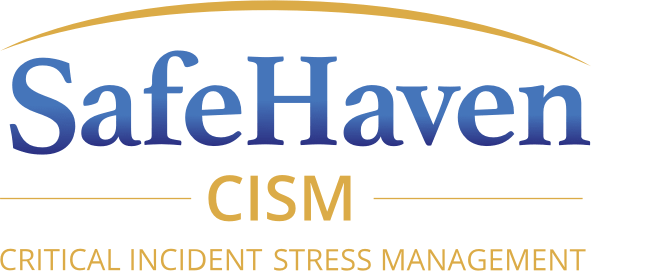What we help with - SafeHaven Trauma Centre
We help organisations
- Understand and manage their psychological risk
- Train and implement psychosocial peer-support networks
- Provide swift and effective crisis & disaster mental health care when an incident occurs
- Provide specialist follow-up trauma support and treatment for their personnel
Benefits of Critical Incident Stress Management (CISM)
- Stabilises crisis situations swiftly and effectively
- Assists in reducing job stress and burnout
- Reduces absenteeism
- Reduces turnover of personnel
- Promotes employee wellness and team morale
- Provides risk management for adversarial situations, helping decrease litigious responses
- Decreases the overall cost to employers
When is an incident considered critical?
A psychological critical incident is when an event may cause feelings of distress and a person could find themselves overwhelmed and their usual coping mechanism insufficient. Such a situation is likely to evoke reactions such as helplessness, fear or horror and will typically involve the actual, or perceived, serious threat to someone’s welfare or their life. These types of incidents usually undermine our sense of safety, security and competency in the world. Exposure to these types of incidents often results in psychological injury such as Acute Stress and Post Traumatic Stress Disorder (PTSD).
Examples of critical incidents in the workplace:
- Serious accidents/injuries at work
- Workplace violence
- Bullying
- Poor stress management skills of personnel
- Chronic job related stress leading to a personal breakdown
- Robbery/workplace crime
- Suicide
- Unexpected workplace fatality
- Death of a colleague away from work
- Death of an employees’ family member
- Downsizing/layoffs
- Mergers
- Terrorist activities
- Natural disasters such as fires, floods, hurricanes etc.
- Line of duty death or injury (for example among emergency services personnel)
- Being an emergency worker/first responder in critical incidents and disasters (emergency services, police, fire and rescue service etc.)
Examples of personal critical incidents that can affect your personnel:
- Road traffic accident
- Any accident involving serious injury and/or property damage
- Industrial accidents involving serious injuries or fatalities
- Sudden unexpected death of a relative, friend of colleague
- Assault or abuse (sexual, domestic, emotional, psychological)
- Robbery and violent crimes
- Suicide or attempted suicide
- Homicide
- Any life threatening experience
- Adverse/negative publicity
- Observing or being aware of unethical acts
- Witnessing any of the individual or workplace critical incidents

